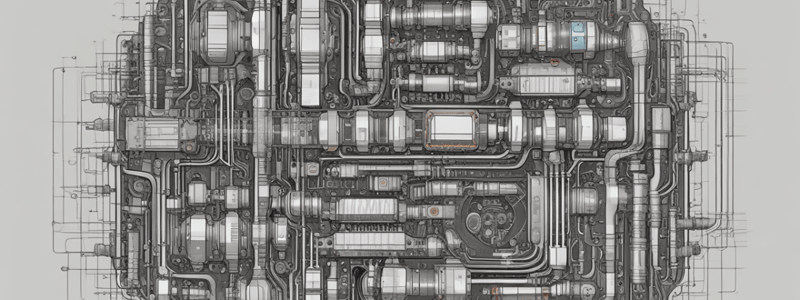Podcast
Questions and Answers
What is one advantage of using wireless inputs and outputs in industrial applications?
What is one advantage of using wireless inputs and outputs in industrial applications?
- Increased energy consumption in the facility
- Reduction in the need for twisted pair cables (correct)
- Elimination of all electrical maintenance
- Lower initial setup costs compared to wired systems
Which type of output allows a PLC to command a pump to operate in two states?
Which type of output allows a PLC to command a pump to operate in two states?
- Discrete output (correct)
- Data historian
- Analog output
- Smart instrument bus
What is an example of an analog output application in automation?
What is an example of an analog output application in automation?
- Sending a signal to a data historian
- Triggering an alarm system
- Setting a valve to a specific flow percentage (correct)
- Turning a light bulb on or off
What role does the HMI play in a control system?
What role does the HMI play in a control system?
What defines the LoRa standard in wireless communication?
What defines the LoRa standard in wireless communication?
Which of the following outputs is specifically used for logging and trending information over time?
Which of the following outputs is specifically used for logging and trending information over time?
What is a potential drawback of using a vendor-specific wireless output standard?
What is a potential drawback of using a vendor-specific wireless output standard?
What is the primary function of output values from a PLC?
What is the primary function of output values from a PLC?
Which of the following is an example of a discrete output in a PLC system?
Which of the following is an example of a discrete output in a PLC system?
What type of input reflects the current height of a tank?
What type of input reflects the current height of a tank?
How can a PLC influence the physical world in a process?
How can a PLC influence the physical world in a process?
Which action is NOT typically controlled by PLC outputs?
Which action is NOT typically controlled by PLC outputs?
In a PLC system, what is an example of an analog output?
In a PLC system, what is an example of an analog output?
What allows output commands to be sent to devices in a PLC network?
What allows output commands to be sent to devices in a PLC network?
Which statement about digital outputs in a PLC is true?
Which statement about digital outputs in a PLC is true?
Flashcards are hidden until you start studying
Study Notes
General Overview of PLC Outputs
- Outputs from PLCs (Programmable Logic Controllers) enable control of physical devices in a plant by sending specific commands.
- Examples include controlling a pump’s operation or adjusting a valve to manage fluid flow rates in a tank.
Types of Inputs and Outputs
- Discrete Inputs: Indicate specific conditions such as high or low tank levels.
- Analog Inputs: Provide continuous data like the current height of the fluid in the tank.
- Discrete Outputs: Often used to turn devices on or off, e.g., activating a pump.
- Analog Outputs: Used to send commands that specify variable settings such as partially opening a valve.
Control Mechanisms
- Activating pumps allows for liquid drainage from a tank, while adjusting valves controls fluid entry and exit.
- Outputs are essential for impacting processes physically and managing flow rates effectively.
Communication Methods
- Output devices can connect through bus networks, facilitating communication between multiple devices across a plant.
- Wireless technologies enable outputs to be sent without physical cabling, simplifying installation and reducing costs.
Wireless Technologies in Output Management
- Wireless telemetry allows the sending of commands to devices like valves without hardwired connections, enhancing flexibility.
- Wireless IO standards are often vendor-specific but are evolving with industry adoption, leading to broader standards like LoRa, which supports long-range communications.
Output Types and Interfaces
- Discrete Outputs: Limited to binary states (on/off) for basic functions.
- Analog Outputs: Allow variable settings for finer control of devices such as valves.
- Human Machine Interface (HMI): Provides a visual digital output for operators, facilitating ease of monitoring and control.
- Data Historian: Records and trends operational data over extended periods for analysis and process optimization.
Current Trends in Wireless IO
- The transition towards wireless IO is gaining traction in heavy industries, previously more common in laboratory settings.
- Cost considerations and operational flexibility are driving the adoption of wireless technologies in industries like warehousing and manufacturing.
Emerging Standards
- Standards like ISA 100 focus on non-vendor-specific wireless communications, promoting interoperability among devices.
- The importance of standardized communication in enhancing efficiency and flexibility in industrial environments is increasing.
Studying That Suits You
Use AI to generate personalized quizzes and flashcards to suit your learning preferences.




